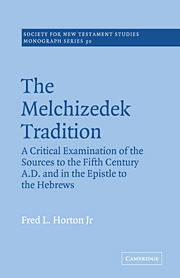 The Melchizedek Tradition
The Melchizedek Tradition Published online by Cambridge University Press: 16 October 2009
This study originated in a short paper which I presented to Professor W. D. Davies' seminar on the Epistle to the Hebrews in 1968 which dealt with the relationship between Qumran and Hebrews. That paper dealt at length with a fragmentary document from the Dead Sea which treated Melchizedek as a divine figure, and at the time the parallels between Hebrews and that document seemed irresistible to me. To find a definite parallel to Hebrews at Qumran which was not also to be found in other forms of the Judaism of the period opened the possibility for a new way of understanding Hebrews and suggested some new answers to old questions about the origin and background of the Epistle.
The first task, it seemed to me, was to establish the parallel between Qumran and Hebrews as to Melchizedek, and it was to this task that I turned when I began research for this present work which was to be my dissertation. In the fall of 1969 I presented another paper to the Biblical Studies Seminar at Duke University in which I attempted to give further evidence for the association of Hebrews and Qumran on the basis of the Melchizedek fragment from Qumran. Simply to have expanded this study, however, would have been to assume the correctness of my assumptions, and it was for that reason that I decided that I should attempt to show the development of Melchizedek speculation through the early centuries of the Christian era in an effort to relate Hebrews to an independent development of thought.
To save this book to your Kindle, first ensure [email protected] is added to your Approved Personal Document E-mail List under your Personal Document Settings on the Manage Your Content and Devices page of your Amazon account. Then enter the ‘name’ part of your Kindle email address below. Find out more about saving to your Kindle.
Note you can select to save to either the @free.kindle.com or @kindle.com variations. ‘@free.kindle.com’ emails are free but can only be saved to your device when it is connected to wi-fi. ‘@kindle.com’ emails can be delivered even when you are not connected to wi-fi, but note that service fees apply.
Find out more about the Kindle Personal Document Service.
To save content items to your account, please confirm that you agree to abide by our usage policies. If this is the first time you use this feature, you will be asked to authorise Cambridge Core to connect with your account. Find out more about saving content to Dropbox.
To save content items to your account, please confirm that you agree to abide by our usage policies. If this is the first time you use this feature, you will be asked to authorise Cambridge Core to connect with your account. Find out more about saving content to Google Drive.